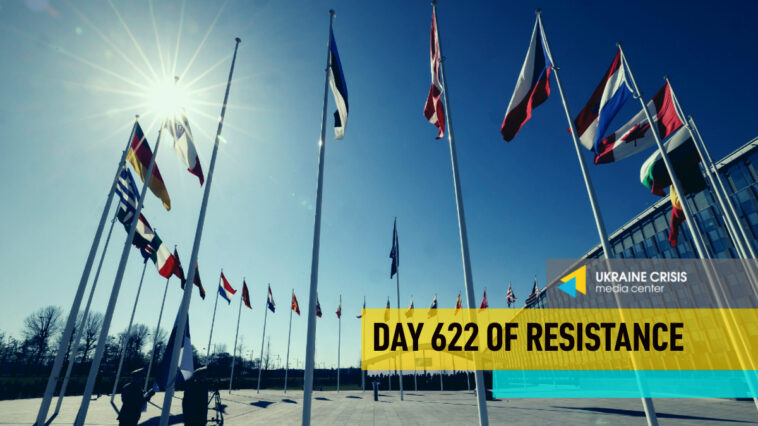NATO allies freeze participation in the Treaty on Conventional Armed Forces in Europe after Russia’s pullout. Ukraine deploys additional NASAMS air defense systems, Zelenskyi says. The EU is set to proceed on Ukraine’s membership bid, but the final wording of the opinion is yet to be finalized, Bloomberg says.
NATO allies freeze participation in Treaty on Conventional Armed Forces in Europe after Russia’s pullout
In a statement issued Tuesday, NATO allies condemned a decision by Russia to withdraw from the Treaty on Conventional Armed Forces in Europe (CFE), and said they would suspend its operation in response. The decision was fully supported by all NATO Allies.
“Russia’s withdrawal is the latest in a series of actions that systematically undermines Euro-Atlantic security,” NATO allies said.
“While recognizing the role of the CFE as a cornerstone of the Euro-Atlantic security architecture, a situation whereby Allied States Parties abide by the Treaty, while Russia does not, would be unsustainable. Therefore, as a consequence, Allied States Parties intend to suspend the operation of the CFE Treaty for as long as necessary, in accordance with their rights under international law,” the statement reads.
Allies reiterated their commitment to “reduce military risk, and prevent misperceptions and conflicts,” based on key principles of “transparency, compliance, verification, reciprocity and host nation consent.” They invited those states that share this commitment and these principles, to “join our efforts to also contribute to increasing predictability and stability in the Euro-Atlantic area.”
On November 7, Russia withdrew from the Treaty on Conventional Armed Forces in Europe. Russia suspended participation in the treaty in 2007 and halted active participation in 2015. Russian President Vladimir Putin signed a decree on May 10, 2023 terminating his country’s participation in the pact.
The Treaty on Conventional Armed Forces in Europe, signed in 1990, placed verifiable limits on categories of conventional military equipment that NATO and the then-Warsaw Pact could deploy. The treaty was designed to prevent either side of the Cold War from amassing forces for a swift offensive against the other in Europe.
Ukraine deploys additional NASAMS air defense systems, Zelenskyi says
At a cabinet meeting Tuesday, President Zelenskyi said he got reports of ammunition and equipment being delivered to troops in the past day.
“I held a daily cabinet meeting and heard reports of new ammunition, weapons and materiel being delivered to troops in the past day. Additional NASAMS [air defense] systems from partners were put on combat duty. Timely reinforcement of our air defense before winter,” Zelenskyi said on Telegram.
He said he had also heard reports from the front lines, including situation updates from the Kupyansk, Bakhmut, and Avdiyivka axes, and the south.
Ukraine’s intelligence briefed the President on the situation in the occupied territory, in the Black Sea region and in the member states of the Collective Security Treaty Organization. Ukraine’s Security Service briefed him on counterintelligence operations.
EU set to proceed on Ukraine membership bid, but no final wording so far, Bloomberg says
The EU will likely recommend opening accession talks with Ukraine, but the final wording of the opinion is yet to be finalized, Bloomberg said, citing said the people, who asked not to be identified because the process is private.
The European Union’s executive arm will meet later Tuesday to finalize a decision on whether to recommend formally opening Ukraine’s membership talks, with expectations of a positive outcome for Kyiv but with conditions attached.
The European Commission will likely recommend that member states open formal negotiations upon the completion of reforms and legislation on minorities, anti-corruption as well as “de-oligarchisation” and lobbying, according to people familiar with the matter and documents seen by Bloomberg.
The commission’s opinion, which will be released on Nov. 8, will need to be approved by member states when EU leaders meet in December for a summit.
Hungarian Prime Minister Viktor Orbán’s cabinet could veto the start of Ukraine’s accession talks with the EU, Orbán’s Political Director, Balázs Orbán told NOS.
Balázs Orbán said Hungary could block Ukraine’s next steps toward EU accession over its alleged treatment of Hungarian minorities. He referred to a recent language law that means that minority state schools must spend increasing amounts of time – at least 70 per cent, teaching in Ukrainian. Hungary is worried that children from Hungarian families in Ukraine will “have poor performance at school.”
“We cannot accept that. Hungary’s position is crystal clear: as long as the law is in force, there can be no discussions with the Ukrainians on their accession to the European Union,” Balázs Orbán said.
Assessing Global Warfare in Contemporary Conflicts. Ukraine in Flames #529
In this episode of Ukraine in flames we delve into the challenges, realities, and future projections of global warfare. The evolving nature of warfare, Russia’s nuclear capabilities, the changing dynamics of international institutions, and Poland’s commitment to enduring and forming a coalition to counter Russian influence are all key points discussed by notable experts Valeriy Chaly and Yuriy Shcherbak. Take a watch of UIF #529 to learn more!
Guests:
- Valeriy Chaly, Chairman of the Board, Ukraine Crisis Media Centre, Ambassador of Ukraine to the United States in 2015-2019
- Yuriy Shcherbak, politician, writer, Ambassador of Ukraine to Israel, the USA and Canada




